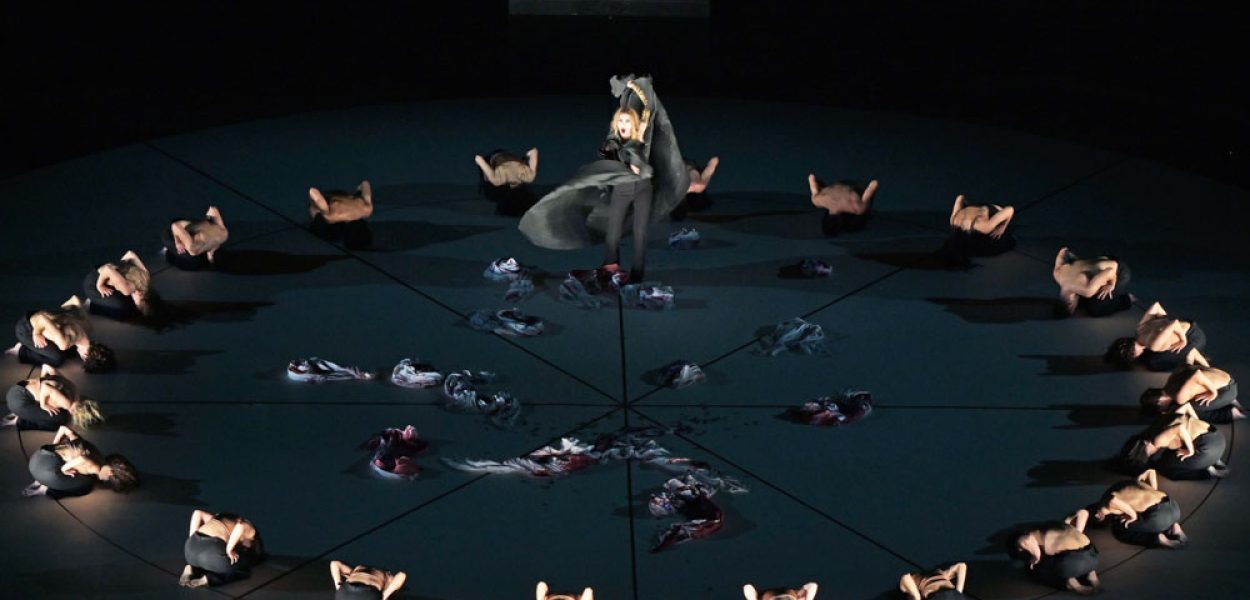
Oresteia by the National Theatre of Greece
The Oresteia has been presented by the National Theatre at Epidaurus five times to date: in 1954 and 1959 directed by Dimitris Rodiris, in 1972 directed by Takis Mouzenidis, in 2001 directed by Yannis Kokkos, and in 2019 by Io Voulgaraki, Lilly Meleme, and Georgia Mavragani, who directed Agamemnon, The Libation Bearers, and The Eumenides respectively, marking their directorial debut at Epidaurus.
Translation Eleni Varopoulou • Direction – Dramaturgical Editing Theodoros Terzopoulos • Associate Director Savvas Stroumbos • Sets – Costumes – Lighting Theodoros Terzopoulos • Original Music Composition Panagiotis Velianitis • Dramaturgy Consultant Maria Sikitano • Production Dramaturg Eirini Moundraki • Assistant Director Theodora Patiti • Costume Design Associate Panagiota Kokkorou • Lighting Design Associate Konstantinos Bethanis • Artistic Collaborator Maria Vogiatzí • Video Nikos Pastras • Photography Johanna Weber
Cast (in alphabetical order): Babis Alefantis (Pylades), Evelyn Assouad (Cassandra), Tasos Dimas (Guard / Leader / Herald), Konstantinos Zografos (Orestes), Elli Ingliz (Nurse), David Malteze (Aegisthus), Anna Marka Bonissel (Prophetess), Nikos Ntassis (Apollo), Ntinos Papageorgiou (Messenger), Aglaia Pappa (Athena), Myrto Rozaki (Electra), Savvas Stroubos (Agamemnon), Alexandros Tountas (Servant), Sofia Hill (Clytemnestra / Clytemnestra’s Ghost)
Chorus: Babis Alefantis, Katerina Ambliantiti, Evelyn Assouad, Christoforos Vogiatzis, Natalia Georgosopoulou, Katerina Dimati, Pyrros Theofanopoulos, Elli Ingliz, Vasilina Katerini, Thanos Magklaras, Elpiniki Marapidi, Anna Marka Bonissel, Lygeri Mitropoulou, Rozy Monaki, Aspasia Batatoli, Nikos Ntassis, Ntinos Papageorgiou, Vangelis Papagiannopoulos, Stavros Papadopoulos, Myrto Rozaki, Giannis Sanidas, Alexandros Tountas, Katerina Hill, Michalis Psalidas
Photography: Johanna Weber
The emblematic Oresteia by Aeschylus, directed by Theodoros Terzopoulos, in the first collaboration between the internationally acclaimed Greek director and teacher and the National Theatre of Greece, is one of the most significant moments in the recent history of Greek theatre. Following its triumphant journey, the production travels to the Ancient Theatre of Philippi on Saturday 2 August.
Terzopoulos’ Oresteia is a work of intellectual and philosophical depth, which, with its harrowing energy, succeeds in expanding the boundaries of art and ultimately narrating the story of humanity itself. As an unquestionably political act and a profoundly multifaceted spiritual experience, the production was met with rapturous reception both by the thousands of spectators who attended it and by the Greek and international press.
Following its premiere at Epidaurus in 2024, the tour across Greece and Cyprus, its presentation in Vicenza, Italy, where it opened the 77th Cycle of Classical Performances at the historic Teatro Olimpico, and most recently its journey to distant China, at the Huichang Theatre Village, this singular production returns to the place where its thrilling journey first began to offer us all the chance to experience it once more.
About Oresteia
In 458 BCE, during a time of violent social and political upheaval, Aeschylus presents the Oresteia (Agamemnon, The Libation Bearers, The Eumenides) at the Dionysia festival, the only surviving trilogy from ancient drama and the last of Aeschylus’ extant works, completed just two years before his death, reflecting many of the sweeping changes of his era.
At the heart of the trilogy lies the tragic course of the House of Atreus, the blood curse that spreads across all the characters and the chorus through successive stages, leading from instability to a dead end.
In the first two plays, Agamemnon and The Libation Bearers, the murders that end the tyrannical reigns of Agamemnon and Clytemnestra mark the peak of a new period of crisis and disorder, which is reflected in The Eumenides. The Furies, chthonic deities representing instinct and impulse, serve as guardians of memory. Though aware that any conflict with the gods is doomed to fail, they rise up and threaten the order of the city. Orestes must be punished not only for the crime itself, but for its repetition, so as to ensure that the memory of the conflict survives.
Athena tries at all costs to establish a “peace pact” between the gods and the Erinyes, offering compensation and privileges. To achieve compromise, she shifts violence into the realm of language. Her speech introduces deceitful persuasion, falsehood, and misdirection into the political sphere. The Erinyes yield of their own will. Donning the characteristic crimson garments of resident aliens, they are proclaimed Eumenides and removed from the city's core. They are led into obscurity, into oblivion, into the depths of the earth. Democracy has been established. But not without cost. Anything incompatible with the new regime — the part of the living body linked to memory, instinct, animal vitality — has been permanently exiled. The new order is imposed by mechanisms of power in such a way that these vital forces appear never to have existed.
The Erinyes compromise and accept the social status of resident aliens, yet their internal structure is not altered. Like natural phenomena that do not vanish from the earth but follow a spiral path of transmutation, escalation, and de-escalation, we may imagine the chthonic deities withdrawing and receding, only to re-emerge again, assuming ever new and unexpected forms.
Director’s Note
Why does the Oresteia continue to exert such a terrifying pull? One possible answer might be that human beings have a need for a deeper connection with Myth. The myth of the Oresteia is dangerous; it belongs to the realm of the uncanny and the strange. It evokes terror because it reveals the unruly, the violent, and the laws of the depths that cannot be tamed. Clytemnestra invites us to shatter the mirror together, so that from its fragments a new nightmarish image may be born, one that nonetheless retains the dark roots of the myth.
Our intention is to study the depths of the Oresteia myth and to search for the unpredictable, the uncommon, the paradoxical. The characters offer their bodies upon the altar of the uncanny, posing constant questions and dilemmas. The aesthetic of the performance arises from the dynamic relationship of the Body with Myth, Time, and Memory. Once again, we pose the fundamental ontological question: “What is it about?”, a question that admits no final answers, but instead constantly propels us towards ever-deeper exploration of the root of sound, of the word, of the many dimensions of the human enigma, and of the reconstruction of a new Myth.
Theodoros Terzopoulos
|ORESTEIA|
|Saturday 2 August, 21.00 |
|Ancient Theatre of Philippi|
Duration: 200’ minutes
Ticket prices: €20 General Admission // €15 Seniors (65+) // €10 Students, Unemployed, People with Disabilities // 15€ Group Bookings
Online presale: https://www.ticketservices.gr/event/nt-oresteia/?lang=el
Presale
Kavala: Municipality Visitor Information Centre (former EOT), Central Square, tel: 2510-620566, daily from 10:00 to 14:00 and 18:00 to 21:00, while on performance days tickets will be available at the on-site box office from 19:00.
Krinides: “Proskinio” Café, Ancient Theatre of Philippi, tel. 2510516090
*Entry to the theatre is not permitted after the performance has begun.
**Once again this year, a KTEL Kavala bus will be available to transport spectators to and from the Ancient Theatre of Philippi upon presentation of a valid ticket for the respective performance, along with a special fare of €4.00.
Departure from the KTEL Kavala station at 18:30 and return after the end of the performance.
Note: Holders of named invitations for the 68th Philippi Festival are kindly requested to confirm their intention to use them by Monday 31 July. ID checks will be carried out at the theatre entrance on the day of the performance.
For more information, you may contact the Municipal and Regional Theatre of Kavala at 2510 220876 (10.00 – 14.00)
4 Philippou Street,
65403, Kavala
Tel.:+30 2510 220 876
Email: [email protected]
13 Averof Street, Kavala
Tel.: +30 2510 834 777
10 Lydias Street, Krinides


© Municipal and Regional Theatre of Kavala. All Rights reserved.
Terns of Use | Personal Data | Credits